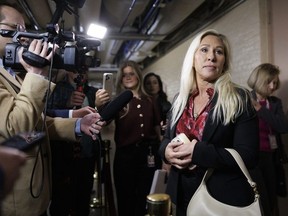Politics
Marjorie Taylor Greene Challenges GOP Leadership, Calls Men Weak

Rep. Marjorie Taylor Greene (R-Georgia) has ignited controversy within her party after publicly criticizing the leadership of the Republican Party, specifically targeting male members of Congress as “weak.” This confrontational stance comes amid ongoing discussions about the government shutdown and legislative strategies.
Greene recently shared on social media her frustration with House Speaker Mike Johnson (R-Louisiana), following a disagreement regarding the Senate’s ability to abolish the 60-vote filibuster requirement. She reported receiving numerous angry texts from Johnson after she suggested that the Senate could end the government shutdown with just Republican votes. “He told me they can’t do it and it’s math,” Greene recounted, highlighting her disagreement. In response, she cited a recent instance where the Senate changed its rules to confirm a large group of nominees with a single vote, stating, “I said, ‘They just did it.’”
The tension between Greene and Johnson has drawn attention, with Greene’s remarks reflecting her ongoing conflict with party leadership. She had previously attempted to remove Johnson from his leadership position in 2024 and has been openly critical of former Speaker Kevin McCarthy (R-California), despite eventually forming an alliance with him.
Greene’s Critique of Gender Dynamics in Congress
Greene’s critiques extend beyond mere party politics; she has voiced concerns about the treatment of women in Congress. She argues that capable women, including herself and Rep. Elise Stefanik (New York), have faced unfair treatment, while “weak” Republican men receive accolades. Greene pointed out that under the leadership of President Donald Trump, the Cabinet saw an increase in women in prominent roles, contrasting it with the current Republican-controlled House, where only one woman chairs a committee, Virginia Foxx of the Rules Committee.
“Whereas President Trump has a very strong, dominant style – he’s not weak at all – a lot of the men here in the House are weak. There’s a lot of weak Republican men,” Greene stated, emphasizing a perceived pattern of marginalizing strong Republican women. She suggested that jealousy plays a role in the dynamics, asserting that male colleagues feel threatened by women who are determined to succeed.
In recent months, Greene opted not to run for Senate in Georgia’s upcoming 2026 elections, citing a poll from Trump’s circle that indicated she would lose to Democrat Jon Ossoff. She dismissed the poll’s findings, claiming she refrained from entering the race to avoid alignment with what she termed the “uniparty” that controls the Senate.
Responses from GOP Leadership
The response from GOP leadership to Greene’s accusations has varied. Lisa C. McClain (Michigan), the Republican conference chair, dismissed Greene’s claims against Johnson, stating, “Speaker Johnson has empowered women by treating them – and all members – with the respect they have earned.” McClain emphasized that Johnson believes in merit over identity politics, allowing women to serve alongside him.
Greene has also criticized the treatment of Stefanik following her loss of the ambassadorship to the United Nations, which she found particularly insulting. She remarked on the disparity in how women in the party are treated compared to their male counterparts, asserting that the situation reflects a broader issue within the Republican Party.
Despite the backlash, Greene remains resolute in her stance. Alongside Reps. Lauren Boebert (Colorado) and Nancy Mace (South Carolina), she has signed a discharge petition that would require the Justice Department to release all information related to its investigation of convicted sex offender Jeffrey Epstein, an action that has drawn criticism from the White House.
As the situation unfolds, Greene’s vocal critiques and the reactions of her fellow Republicans highlight the ongoing tensions within the party, particularly regarding gender dynamics and leadership strategies. Her willingness to challenge established norms sets the stage for continued debates within the GOP as it navigates both internal divisions and external pressures.
-

 Politics4 weeks ago
Politics4 weeks agoSecwepemc First Nation Seeks Aboriginal Title Over Kamloops Area
-

 World5 months ago
World5 months agoScientists Unearth Ancient Antarctic Ice to Unlock Climate Secrets
-

 Entertainment5 months ago
Entertainment5 months agoTrump and McCormick to Announce $70 Billion Energy Investments
-

 Science5 months ago
Science5 months agoFour Astronauts Return to Earth After International Space Station Mission
-

 Lifestyle5 months ago
Lifestyle5 months agoTransLink Launches Food Truck Program to Boost Revenue in Vancouver
-

 Technology3 months ago
Technology3 months agoApple Notes Enhances Functionality with Markdown Support in macOS 26
-

 Lifestyle3 months ago
Lifestyle3 months agoManitoba’s Burger Champion Shines Again Amid Dining Innovations
-

 Top Stories2 months ago
Top Stories2 months agoUrgent Update: Fatal Crash on Highway 99 Claims Life of Pitt Meadows Man
-

 Politics4 months ago
Politics4 months agoUkrainian Tennis Star Elina Svitolina Faces Death Threats Online
-

 Sports5 months ago
Sports5 months agoSearch Underway for Missing Hunter Amid Hokkaido Bear Emergency
-

 Politics5 months ago
Politics5 months agoCarney Engages First Nations Leaders at Development Law Summit
-

 Technology5 months ago
Technology5 months agoFrosthaven Launches Early Access on July 31, 2025





















